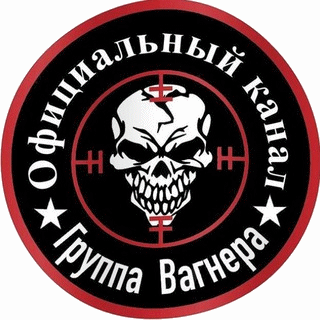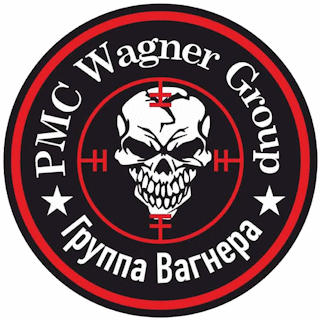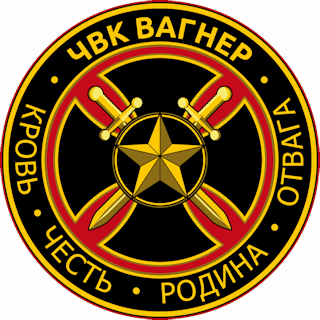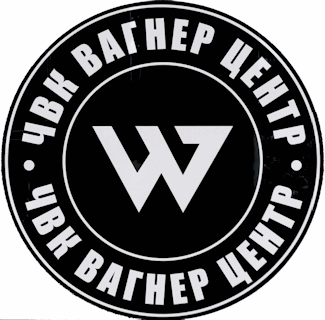Wagner Group
Private Military Company ‘Wagner’, a.k.a.
Chastnaya Voennaya Kompaniya ‘Vagner’, a.k.a.
Chvk Vagner, a.k.a.
PMC Wagner, a.k.a.
 After the death of Yevgeny Prigozhin, his son – 25 year old Pavel Prigozhin – will be in charge of the PMC ‘Wagner’. This was reported by Russian telegram channels. However, so far the heir of the PMC founder is more busy with the division of the property than with the management of PMC. Meanwhile the mercenaries split into two main groups. One half went with Prigozhin’s son, while others signed a contract with the Russian Ministry of Defence.
After the death of Yevgeny Prigozhin, his son – 25 year old Pavel Prigozhin – will be in charge of the PMC ‘Wagner’. This was reported by Russian telegram channels. However, so far the heir of the PMC founder is more busy with the division of the property than with the management of PMC. Meanwhile the mercenaries split into two main groups. One half went with Prigozhin’s son, while others signed a contract with the Russian Ministry of Defence.
"Wagner group" is a Russian paramilitary organization associated with Yevgeny Prigozhin, a Russian oligarch and close associate of President Vladimir Putin. Vagner commanders have fought for the company both in Syria and, before that, in support of Russia-backed separatists in eastern Ukraine. Whatever the group fights for, its style remains the same - this is extreme cruelty. From Syria to Cameroon, from Somalia to Mali - everywhere she was accused of violence, theft, murder and torture.
Sergei Shoigu demanded that all participants in the war in Ukraine who work on the side of Moscow, conclude contracts with the Russian Ministry of Defense by June 14, Yevgeny Prigozhin said that Wagner PMC would not obey this requirement, because it is "the path of shame". The chief of the Russian mercenary group Wagner accused Moscow's military leadership 23 June 2023 of ordering strikes on their camps and killing a "huge" number of forces. "We were ready to make concessions to the defence ministry, surrender our weapons," Yevgeny Prigozhin said in a furious audio message released by his spokespeople. "Today, seeing that we have not been broken, they conducted missile strikes at our rear camps."
On the night of 23 June 2023, an armed rebellion was attempted in Russia. On the evening of June 23, the founder of Wagner PMC, Yevgeny Prigozhin, reported on the attack on the rear camps of the PMC and blamed the leadership of the Ministry of Defense for this. The department immediately denied this information, calling it a provocation. That same evening, the FSB opened a criminal case against Prigozhin under the article on armed rebellion after receiving threats. In Moscow, the Moscow and Voronezh regions, a counter-terrorist operation (CTO) regime was introduced, which was canceled on June 26.
On June 24, "Wagner" managed to block Rostov-on-Don and take control of the city's military facilities, Prigozhin also announced a campaign against Moscow.Prigozhin vowed to 'stop' Russian military leadership. "The council of commanders of PMC Wagner has made a decision -- the evil that the military leadership of the country brings must be stopped," Yevgeny Prigozhin said in an audio message released by his spokespeople, urging Russians to remain calm. The rebellion saw Wagner forces sweep into the southern city of Rostov-on-Don and capture military headquarters there before marching towards the Russian capital in what Prigozhin described as a “march of justice” to oust Defence Minister Sergey Shoigu and chief of the general staff Valery Gerasimov.
On the evening of June 24, the Kremlin reported on the agreements reached with the founder of the PMC to de-escalate the situation. President of Belarus Alexander Lukashenko took part in the negotiations to resolve the situation. According to the agreements reached, Prigozhin announced the return of fighters and equipment to field camps, and he himself would move to Belarus. On June 27, the FSB announced the termination of the criminal case against the founder of the PMC.
 Far from being autonomous, Russian PMCs and their leaders maintain close ties with the Russian security apparatus. The Wagner Group is particularly known for taking in former Russian military intelligence (GRU) officers. Putin himself admitted to the links between the Russian state and Prigozhin’s men after its failed uprising. “From May 2022 to May 2023, the Russian state paid more than 86 billion roubles (approximately $940 million) to the Wagner Group,” the Russian president said.
Far from being autonomous, Russian PMCs and their leaders maintain close ties with the Russian security apparatus. The Wagner Group is particularly known for taking in former Russian military intelligence (GRU) officers. Putin himself admitted to the links between the Russian state and Prigozhin’s men after its failed uprising. “From May 2022 to May 2023, the Russian state paid more than 86 billion roubles (approximately $940 million) to the Wagner Group,” the Russian president said.
Understanding the boundary between the field of activity of PMC Wagner and official Russian structures can be difficult. The mercenaries are connected with the GRU, and many operations with their participation are in the interests of the Kremlin. Some missions, such as protecting the dictatorial regimes of the Central African Republic and Sudan, look more typical of mercenaries - especially given that the activities of Wagner PMCs are often associated with the development of gold and diamond deposits.
The Wagner Group meddled in and destabilized countries in Africa, committing widespread human rights abuses and appropriating natural resources. The Wagner Group has also been involved in Kremlin-backed combat operations around the world and is a key player in support of Putin’s war on Ukraine. As Russia’s military has struggled on the battlefield, Putin has resorted to relying on the Wagner Group to continue his war of choice. Most recently in Sudan, the Wagner Group has been supplying Sudan’s Rapid Support Forces with surface-to-air missiles to fight against Sudan’s army, contributing to a prolonged armed conflict that only results in further chaos in the region.
 "If you are fighting under a Russian flag, with a Russian weapon, even if you are eating moldy food and are 10,000 kilometers from home, you are nonetheless fighting for Russia," one Russian mercenary commander told RFE/RL in March 2018. "There is no Syrian war," he added. "There is no Ukrainian war. There is only a war between the Russian Federation and the United States."
"If you are fighting under a Russian flag, with a Russian weapon, even if you are eating moldy food and are 10,000 kilometers from home, you are nonetheless fighting for Russia," one Russian mercenary commander told RFE/RL in March 2018. "There is no Syrian war," he added. "There is no Ukrainian war. There is only a war between the Russian Federation and the United States."
Wagner Group seem like something from Leo Tolstoy’s novel Anna Karenina. In the novel, the main character Count Alexei Vronsky leaves to Serbia as a volunteer to fight against the Ottoman Empire as a part of a squadron he formed at his own expense. Pervasive in Russian literature these militias were used by tsars to pacify internal unrest and to achieve directed military and policy objectives. Today, Russian foreign policy has embraced many of the same ambitions that were born out of a need for “plausible deniability” in Kremlin’s military operations abroad.
The Wagner Group’s roots date back to Russia’s proxy war in Ukraine in 2014, when the Kremlin’s definitions of “soldier,” “mercenary” and “volunteer” first blurred at convenience amid its tacit support for pro-Russian separatists in Ukraine’s east. While Moscow has long insisted Russia is not formally part of the conflict, Russian fighters have routinely taken part in battles — lured by idealism, propaganda and money.
“A huge number of people went to work for Wagner with pleasure,” explained journalist Denis Korotov of Fontanka.ru, an online publication in Saint Petersburg who first broke news of the Wagner mercenaries. “Russia has more than enough people who know how to shoot a gun, and these people can’t make anything close to this kind of money working in the civilian sector,” he added in an interview with VOA in January 2018.
Officially, the Vagner mercenaries signed contracts for civilian work in oil and gas fields. Mercenaries can earn 150,000 rubles ($2,650) a month, plus a bonus of up to 100 percent for completing a three-month tour. In three months, a mercenary can make nearly a million rubles. A commander can earn about three times as much. But a fighter who changes his mind is sent back to the supply port to unload crates at 1,000 rubles a day.
"There is a rumor that Vagner is a so-called meat-grinder project," one of the commanders said in 2018. "What is to be done with those who fought in Donbas? With the idiots from the first wave who are real ideologues? These are scary people who could catalyze society. They can cause trouble like yeast in bread. But in Syria, you can help the interests of the country and get rid of some yeast at the same time. That's what some people are saying. And probably there is something to it."
The representative of the co-owner of the group of companies Yevgeny Prigozhin told RBC 15 November 2017 that the businessman was not related to the "Wagner" PMC and is generally surprised by the very fact of its existence (mercenarism in Russia is legally banned). "We are not aware of the activities of the organization you mentioned. Also, Yevgeny Viktorovich asked to convey that he was extremely surprised by the very existence of this company and does not have anything to do with its activities, "said the representative of the businessman.
Russian Defense Minister Sergei Shoigu signed an order that determines the procedure for organizing the service activities of volunteer organizations. Deputy Minister Pankov noted that the document makes it possible to determine the signing of contracts by July 1 for volunteer detachments with the Ministry of Defense, which will give the detachments the necessary legal status, as well as create uniform approaches to ensuring and performing combat missions by them.
 The head of Wagner PMC, Yevgeny Prigozhin, said that PMCs would not sign contracts with the Russian Ministry of Defense. This was reported by the press service of Yevgeny Prigozhin. However, Prigozhin noted that PMC Wagner is integrated into the system of the Ministry of Defense of the Russian Federation and is completely subordinate to its interests.
The head of Wagner PMC, Yevgeny Prigozhin, said that PMCs would not sign contracts with the Russian Ministry of Defense. This was reported by the press service of Yevgeny Prigozhin. However, Prigozhin noted that PMC Wagner is integrated into the system of the Ministry of Defense of the Russian Federation and is completely subordinate to its interests.
“PMC Wagner is organically integrated into the overall system, PMC Wagner coordinates its actions with generals on the right, left, with unit commanders, has the deepest experience and is a highly effective structure,” Prigozhin said. In addition, the military company coordinates its actions and fulfills the tasks set by General of the Army Sergei Vladimirovich Surovikin. Prigogine also noted the mind, literacy and experience of the commander.
On June 20, 2017, OFAC designated the Wagner Group pursuant to E.O. 13660 for being responsible for or complicit in, or for having engaged in, directly or indirectly, actions or policies that threaten the peace, security, stability, sovereignty, or territorial integrity of Ukraine, and on November 15, 2022, the Department of State redesignated the Wagner Group pursuant to E.O. 14024 for operating or having operated in the defense and related materiel sector of the Russian Federation economy. The Wagner Group has also been sanctioned by Australia, Canada, Japan, the United Kingdom, and the European Union.
On January 26, 2023, OFAC redesignated the Wagner Group pursuant to E.O. 13581, as amended by E.O. 13863, for being a foreign person that constitutes a significant transnational criminal organization. Wagner Group personnel have engaged in an ongoing pattern of serious criminal activity, including mass executions, rape, child abductions, and physical abuse in the Central African Republic (CAR) and Mali. On the same day, OFAC designated the Wagner Group pursuant to E.O. 13667 for being responsible for or complicit in, or having engaged in, the targeting of women, children, or any civilians through the commission of acts of violence, or abduction, forced displacement, or attacks on schools, hospitals, religious sites, or locations where civilians are seeking refuge, or through conduct that would constitute a serious abuse or violation of human rights or a violation of international humanitarian law in relation to the CAR.
|
NEWSLETTER
|
| Join the GlobalSecurity.org mailing list |
|
|
|

